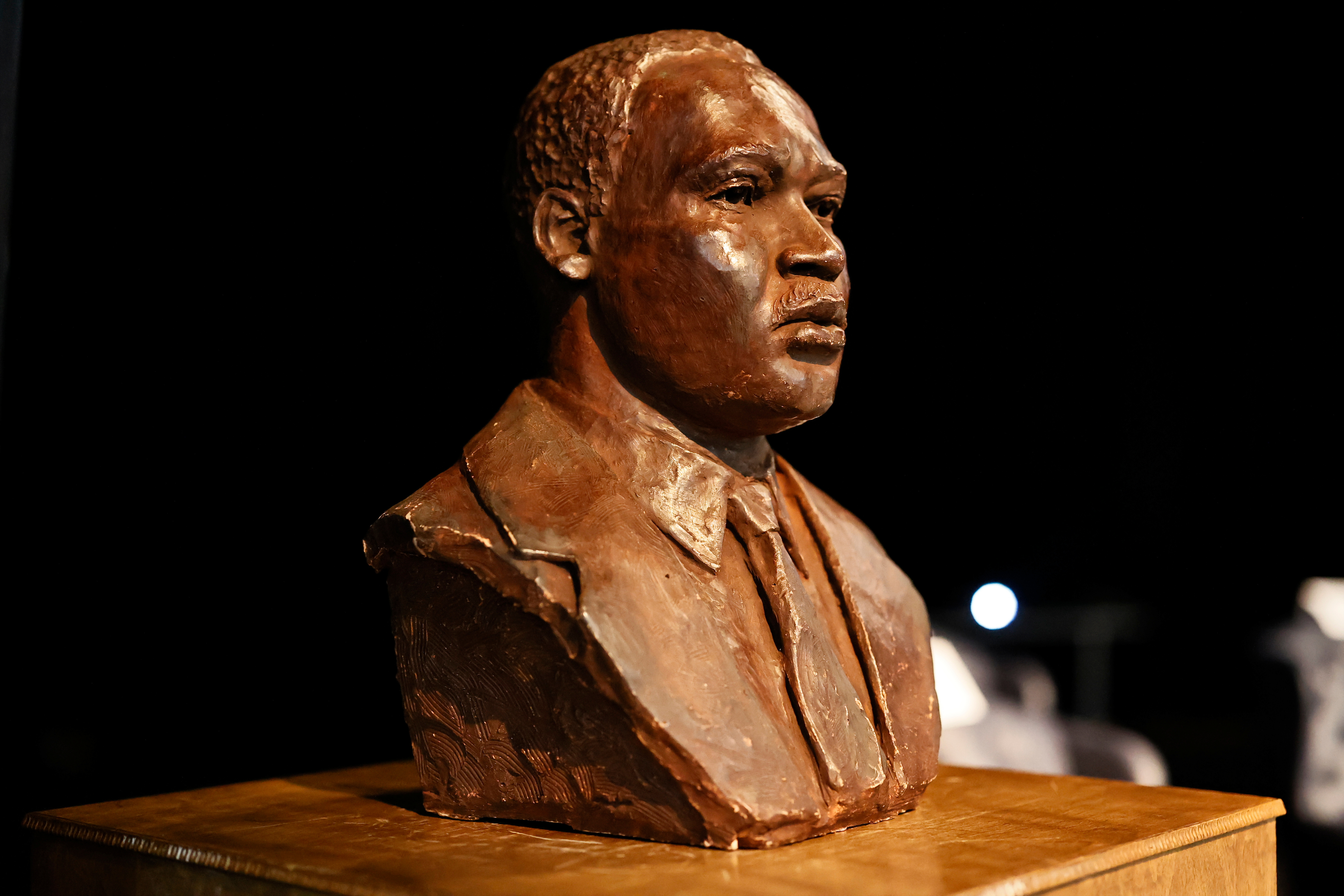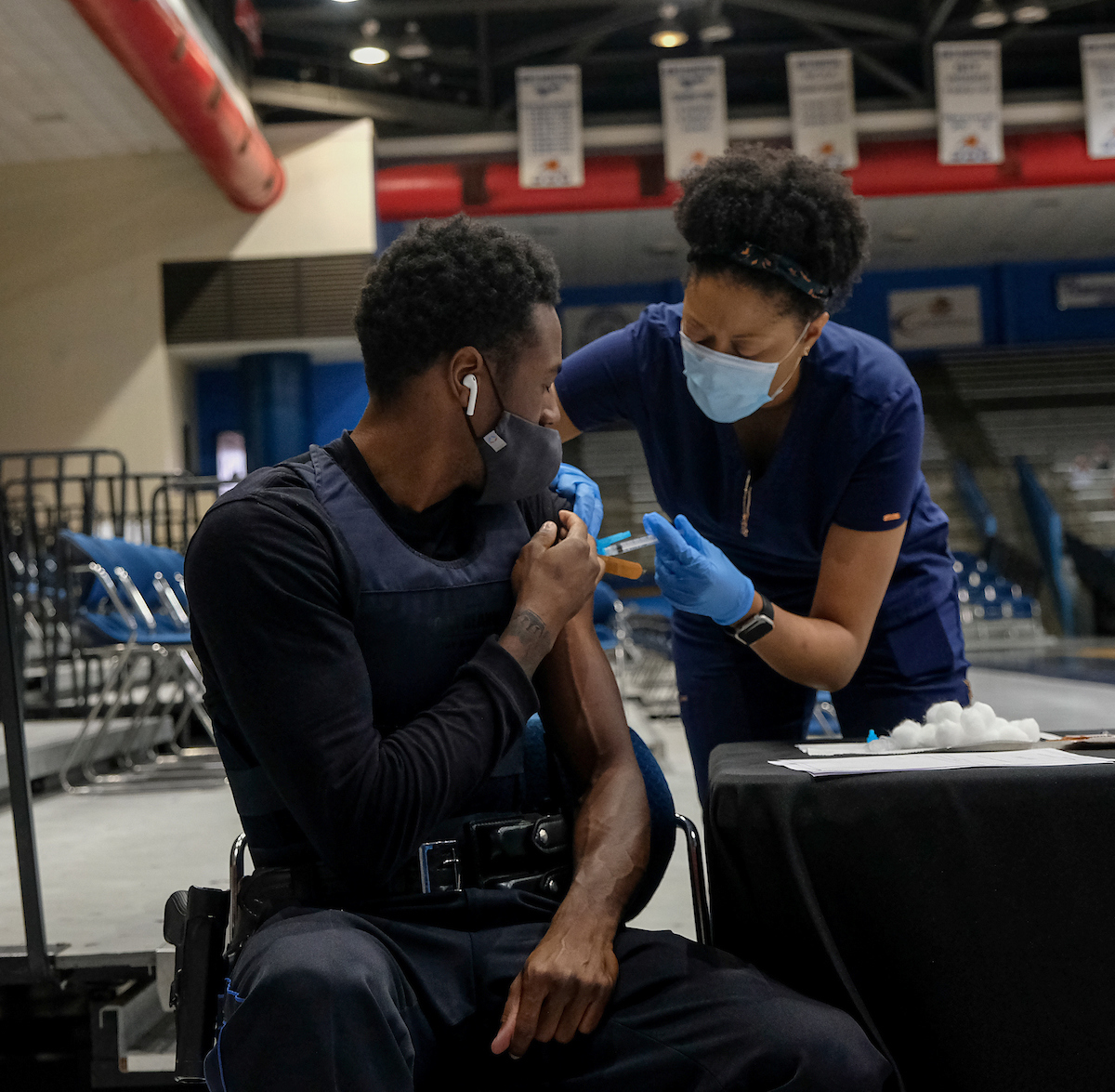
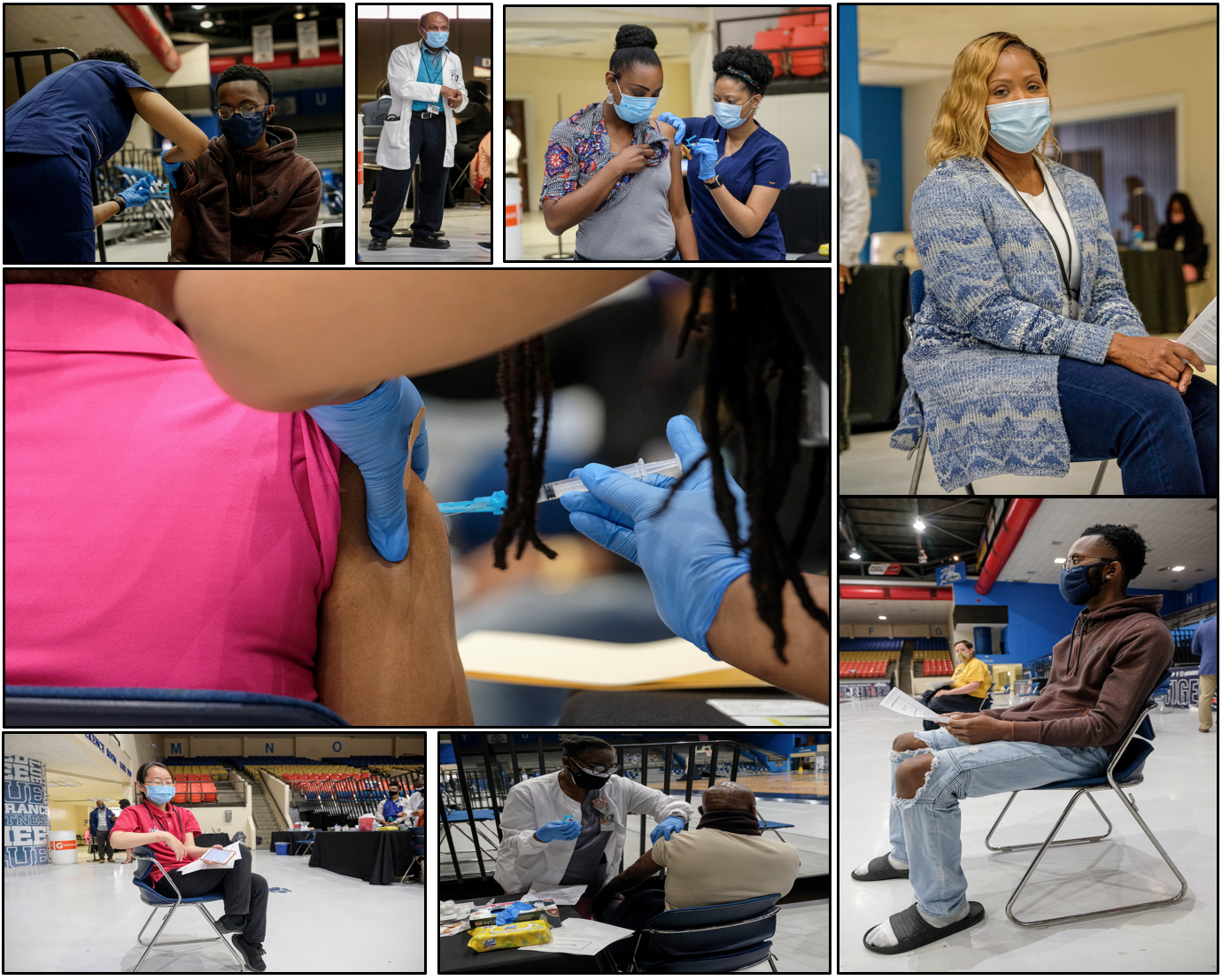
![]()
[hr]
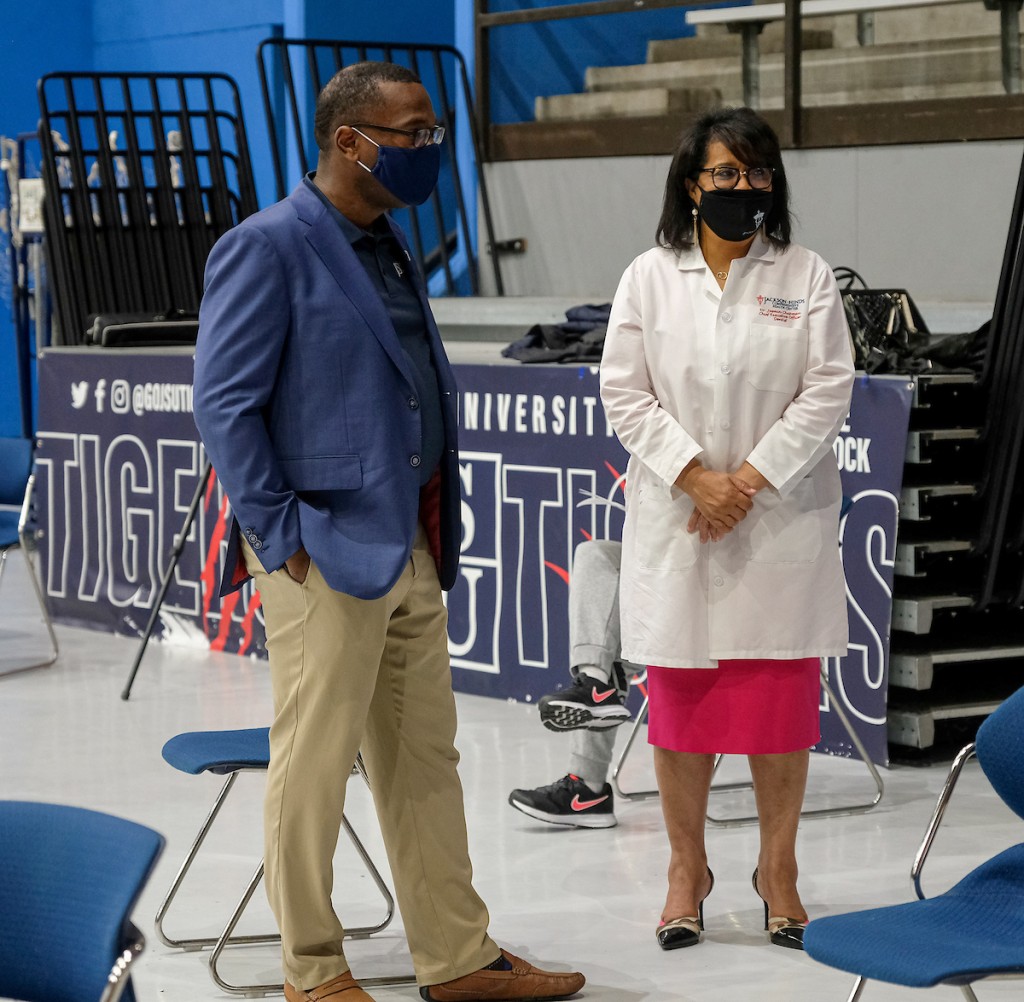
COVID-19 symptoms were so unpleasant that even air brushing against the skin was excruciating for JSU computer engineering student Simon Williams, and memories of constant pain explain why he gleefully joined nearly 300 others for a campuswide vaccination in the Lee E. Williams Athletics and Assembly Center on Friday.
Because of cases such as these throughout the city, Jackson State University established a partnership with the Jackson-Hinds Comprehensive Health Center to provide the Moderna vaccine to faculty, staff and students. The shots are the first of many to come and soon will be available on campus to the general public.
JSU President Thomas K. Hudson, said, “This is part of an ongoing partnership, so this won’t be just a one-day thing. The Mississippi State Department of Health is providing the vaccines, and we’re probably one of a few universities that’s going to provide the actual vaccine to the entire community.”
Hudson said, “Jackson-Hinds is one of a few qualified health facilities to provide the vaccine. It has a large supply available. We want to be a conduit for them to expand their capacity. So, please come out. Get it. And, if you need your second shot, come get it as well.”
Hudson acknowledged that access has been a problem. “Now, it’s much easier for the community because the vaccine is available right here on campus. You don’t need an appointment. You don’t need any insurance. Just fill out a form, and get your vaccine. Plus, we’ll eventually have the vaccine available onsite in our own campus clinic. It’s time to get the university back to normal. Of course, we’ll continue to mask up and practice social distancing.”
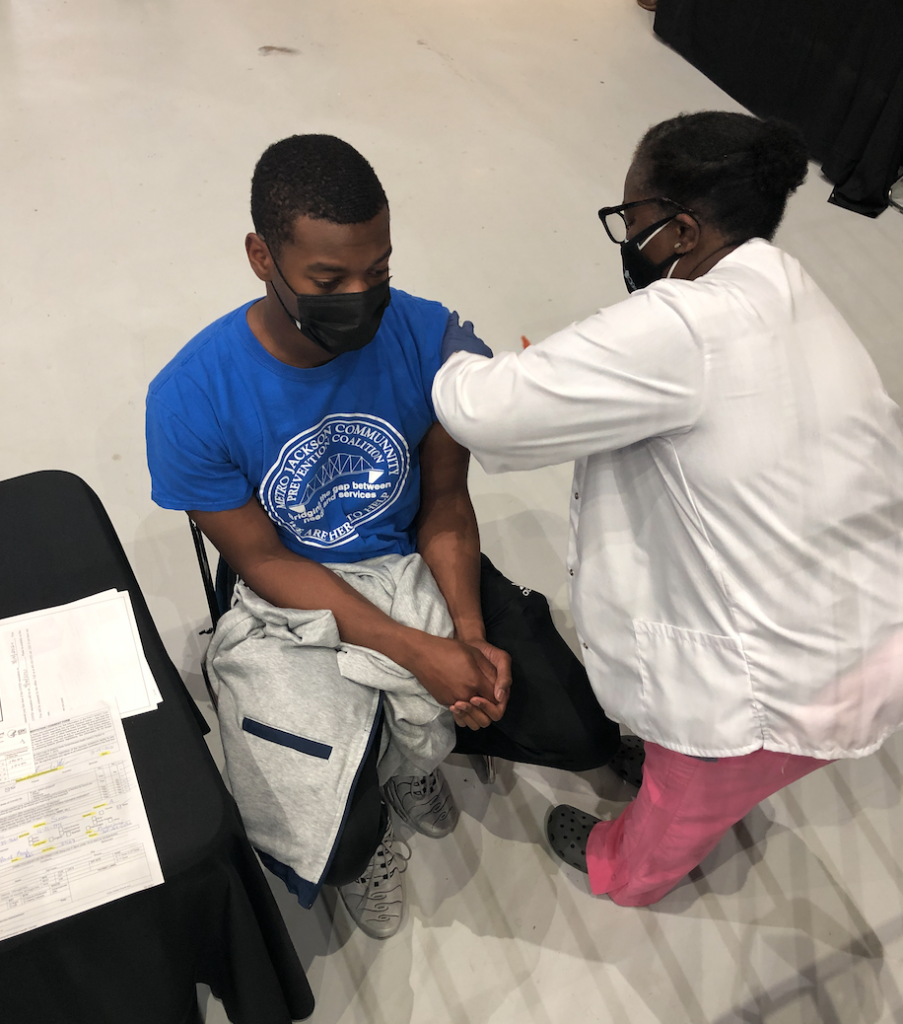
As for student Williams, he said, he, too, will continue to practice safety, especially by wearing a mask because “it’s proven that they work. I may relax a little more when I’m fully vaccinated but certainly not now.”
He said the memories of his suffering are still too fresh. “I wanted to be here today not only to protect myself but my family and friends,” especially since his mother and godparents have underlying health conditions.
Describing his symptoms further, Williams said, “Headaches were continuous – morning till night, 24-7. I could barely move my head because of the intense pain. I would just have to find a way to go to sleep. I would be lying in bed and suddenly the air conditioning would come on, brushing air against my skin and that would even hurt. Just wearing clothes would hurt; having bed covers on my body would hurt; moving around any type of way would hurt. It was just not a pleasant experience at all.”
Williams said his most intense pain occurred during the first three to five days. “After that I had congestion for about three months.” He said his symptoms have lessened as time goes on. “I’m just healing and doing stuff to try to combat it. Getting the vaccine provides some assurance,” said Williams, acknowledging the valid skepticism of so many people. “Sure, the vaccine is new. It came out in a short period of time. But if you’re able, get it. Do your own research; come to your own understanding; be comfortable with getting it. I feel like I’m doing my part to get this pandemic over with so that we can all go back to some sense of normality.”
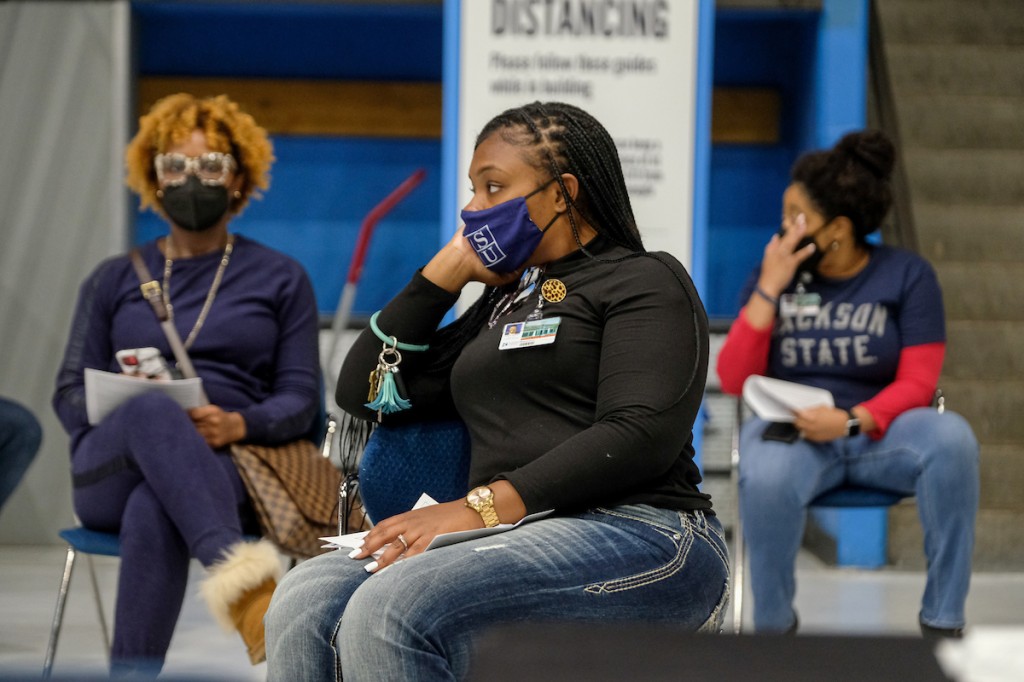
Dr. Jasmin Owens Chapman, chief executive officer of Jackson-Hinds Comprehensive Center, said, “We are a state and federal site and one of only two community health centers in Mississippi that get additional vaccines so that we can go into the communities. She echoes JSU’s COVID-19 marketing campaign “It’s Not Over Yet’ by telling folks not to get too comfortable. “We have a vaccine, and the vaccine will make a difference as to whether you live or die.”
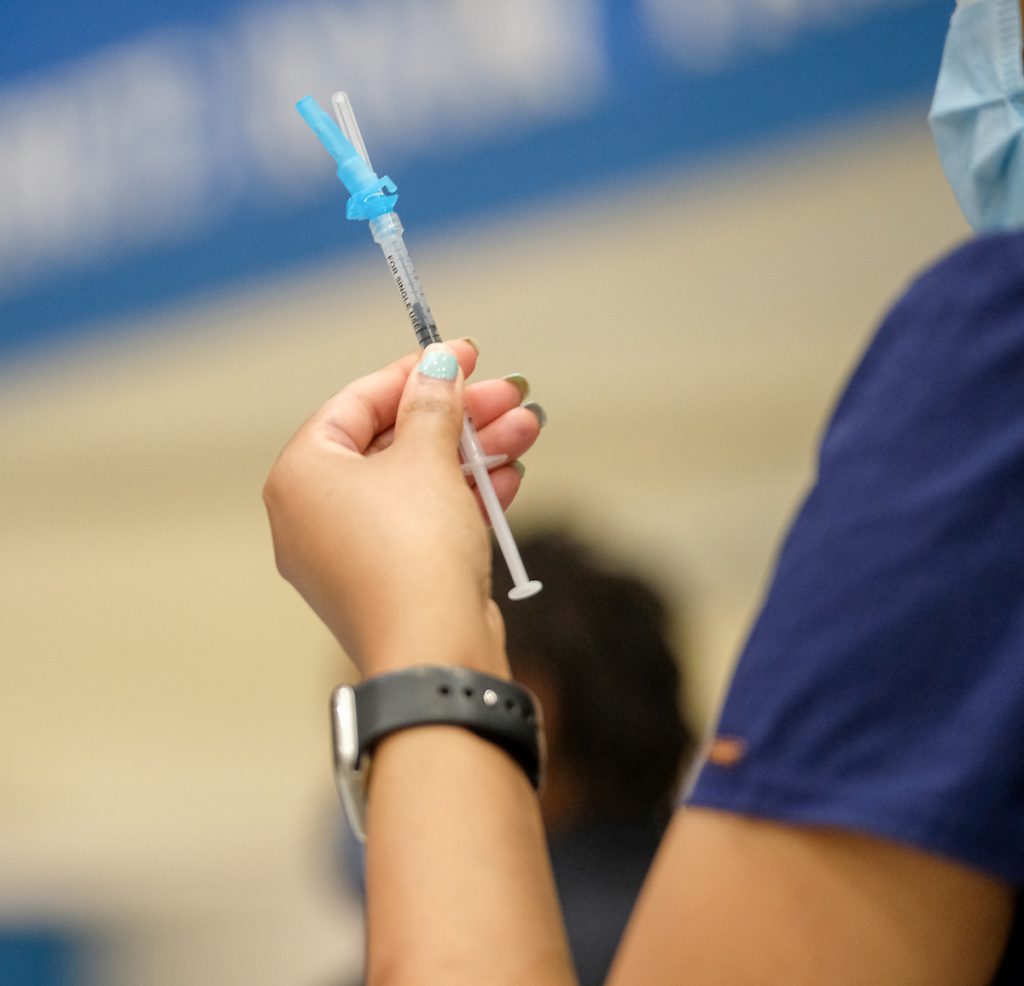
Owens Chapman said, “We want to make sure the people at Jackson State University – the largest university in the city – is also protected. This includes faculty, staff, students and the communities surrounding them. So, with your president, Mr. Hudson, we decided to join together to make this happen. And, he graciously allowed us to use this facility to make this happen. We talked about it three days ago, and we made it happen in less than one week. We’ll be back. He’ll let us know when and where. And, hopefully, this will encourage other people to get the vaccine.”
Furthermore, she lauded the private and public entities that banded together to create a vaccine quicker. She said their efforts were bolstered by unprecedented human and financial resources. She admits that the name “Operation Warp Speed” is a misnomer because it raises questions about the safety of the vaccine.
Nevertheless, Owens Chapman’s medical colleague Dr. Samuel Jones, director of JSU’s Student Health Center, described the successful campus vaccination campaign as “astounding.” He said nearly 300 people received the Moderna vaccine. The effort is believed to the largest distribution so far in a single day for Jackson-Hinds.
With planning done in just three days, Jones hailed the accomplishments of Hudson, the Jackson-Hinds Comprehensive Health Center, and JSU’s legal department, Facilities and Construction Management, Public Safety and University Communications. Jones also debunked the notion that people of color are reluctant to be vaccinated. Instead, he blames access. “Providing the vaccine right here with no appointment and no required insurance makes it so much more convenient,” he said.
“We certainly hold out hope that the vaccine will work in even greater ways because so much is unknown about the long-term negatives or positives with the vaccine.”
Here are anecdotal excerpts from other students, faculty, staff explaining why they got vaccinated:
- Augustina Opara, a senior social work student: “This was important for me to do today because I have people who suffer from health issues. My mother, she’s great now. The entire time she had the virus I was actually with her, nursing her back to health. I didn’t feel safe leaving her in a room completely by herself. So, I just made sure I wasn’t as close. She was only out of work for a month. After I took the vaccine, I feel great. I’m excited. I just want everyone to see that I’m a college student, and I got the vaccine. I hope I encourage others to get it as well. We take a lot of stuff (medicine) that was created over the years that we don’t know much about. We even eat unhealthy foods. So, if I can do that why not just give it a try? I have nothing to lose.”
- Arnitra Hunter, research and economic development: “Well, first of all, I wanted to travel during this summer. I wanted to be protected from COVID-19. I had the virus back in November. And the way the symptoms did me I definitely don’t want that to happen again. From what I hear, the second time is worse. Me and my brother had it. I was very surprised my son didn’t get it. We wore masks, and also I made sure I had some type of disinfectant spray. I did that daily. And I made sure he stayed in his room. You have the chills, the fever, achy joints – things like that. Also, there was loss of taste and smell. I’m just really trying to get those back.”
 Cortez Smith, public safety officer: “I feel like everyone should get it. There’s a lot of doubt, and people are saying the vaccine came out too soon. They don’t know if it’s effective or not. But I feel that we should take that chance. I actually had it. I was traveling to Ohio because that’s where I’m from. So, when I got back I had headaches. It didn’t really impact me too much. My girlfriend had it, and it hit her really bad. We got it at the same time. I don’t usually get headaches. I don’t get sick. I knew something was up. She had left work and went to get tested, and she said she was positive. Everything started adding up because I had a headache, and that’s really the only thing I had. And my nose was running a little bit. And that’s when I went to get tested, and I had the virus as well. After getting the vaccine, I feel a little more comfortable. I’ll still be on my p’s and q’s by wearing my mask and still following the procedures and guidelines.”
Cortez Smith, public safety officer: “I feel like everyone should get it. There’s a lot of doubt, and people are saying the vaccine came out too soon. They don’t know if it’s effective or not. But I feel that we should take that chance. I actually had it. I was traveling to Ohio because that’s where I’m from. So, when I got back I had headaches. It didn’t really impact me too much. My girlfriend had it, and it hit her really bad. We got it at the same time. I don’t usually get headaches. I don’t get sick. I knew something was up. She had left work and went to get tested, and she said she was positive. Everything started adding up because I had a headache, and that’s really the only thing I had. And my nose was running a little bit. And that’s when I went to get tested, and I had the virus as well. After getting the vaccine, I feel a little more comfortable. I’ll still be on my p’s and q’s by wearing my mask and still following the procedures and guidelines.”- Mark Thorne, head men’s track and field and cross-country coach: “Being vaccinated is important. I’m a native of Barbados. I travel a lot and with my team. So, I’m exposed. I think in the future you may need documentation to travel overseas. Personally, I haven’t caught it, but members of my team were infected – coaches and athletes. I encourage everyone to take the vaccine, but it’s their personal choice.”
- Tanya Donnell, Facilities and Construction Management: “Fortunately, I haven’t been sick, and I was nervous about taking the shot. But I know it’s the best thing for me to do. I’ve had two older relatives who passed away from COVID. In my immediate family, a couple of people became ill and recovered. It took about three weeks. If something is recommended for my health, I’m usually going to do it. With it being so new, I had to get over the anxiety. The resistance was because it usually takes years of research and data for a vaccine and its side effects before being released to the public. But with the seriousness of COVID, we cannot delay. I understand that.”
- Tszaunte Green, a junior criminal justice major from Chicago: “I got the vaccine to protect loved ones because it’s not about me. The process here was simple and quick – in and out. My roommate had COVID last year. He was ill for two weeks. He was quarantined during that time, and we’re very close. I isolated myself during that time. After taking the vaccine, I feel good. I can now set an example. COVID-19 has been disruptive. Online classes have been hard. I need in-person teaching.”
- Allin Stevenson, housekeeping department: “I would encourage anybody to take it. None of my employees had taken it before I took it. Everybody’s onboard now because we are around everybody. I took it in February.”
- Dr. Joseph Whittaker, associate provost and vice president of JSU’s Research and Economic Development: “This vaccination is about self-protection, as well as protecting the people around me – family, friends and all. You have to think about something bigger than yourself. This pandemic has been pretty non-specific when it comes to picking victims. I know friends who have been affected but not my direct family. Thankfully, we are all good, and we hope to keep it that way. I think accessibility of the vaccine sets a precedence because of the long, storied history of people of color and the experimentation in the past that hasn’t served us well. So, it’s important for those of us who are in these positions to set an example and to demonstrate that this is a worthwhile thing to do. It’s important for the welfare of everyone. We must look to the future with a more positive outlook and not look at it as more of a ‘risk issue.’ It’s all about welfare and staying healthy. Let’s continue to make life good so that we all survive this pandemic and be better prepared for the next one.”
- Kenneth Williams, Student Engagement and Leadership: “I think getting vaccinated is important simply just to ensure that I am being healthy, that I’m not passing on the virus, and that I’m being accountable. My uncles and my grandmother actually just got out of the hospital last month. They were down with COVID almost three weeks. Just to see them recover from it was a blessing, but to see so many other people who were younger than my uncles and my grandmother not recover pushed me to get the vaccine. So, get tested if you can and also get the vaccine as well. It’s necessary. Student Engagement is exercising university guidelines to ensure that we are keeping our students safe when we are planning activities. With this being my first semester here at the institution, I really didn’t have the opportunity to engage as I would like. Not being able to be one-on-one with the students has been the biggest impact we’ve seen, especially when our job is to engage the students.”
- Capt. Janet Samuel, JSU Public Safety: “Vaccines are safe, and we encourage everyone to take advantage of them while they’re being offered on campus. I’ve had both of my vaccinations with no problems. We especially urge the campus community to come out so they can be protected from the COVID-19 virus. Officers interact with the public daily and especially during football and basketball games, so it’s very important for us to be inoculated. Despite all the doubts about the vaccine and past discrimination, we want the African American community to understand the importance of being vaccinated.”
- DeAndre McGriggs, civil engineering major from Jackson: “The whole shot thing today – it went fairly smooth.My friends got the COVID virus, and I was around them. Luckily, I haven’t caught it. Their symptoms included coughing, hard to breathe, being tired and headaches. On average, I’d say symptoms lasted about a couple weeks or so. The virus scared me into getting the shot. I was nervous about getting the vaccine because everybody wasn’t quite sure of what it was. It’s so new and came so fast. But after seeing my friends catch it, it really frightened me. My other big fear of taking the shot was probably the side effects. But, in my head I’m thinking, ‘I’m not a doctor, and I take shots all the time — like flu shots and regular shots.’ I don’t know the difference between each shot anyway, so I just took a leap of faith. They gave me my date to return, and I will be back. I’ll try to get as many of my friends onboard as I can.”
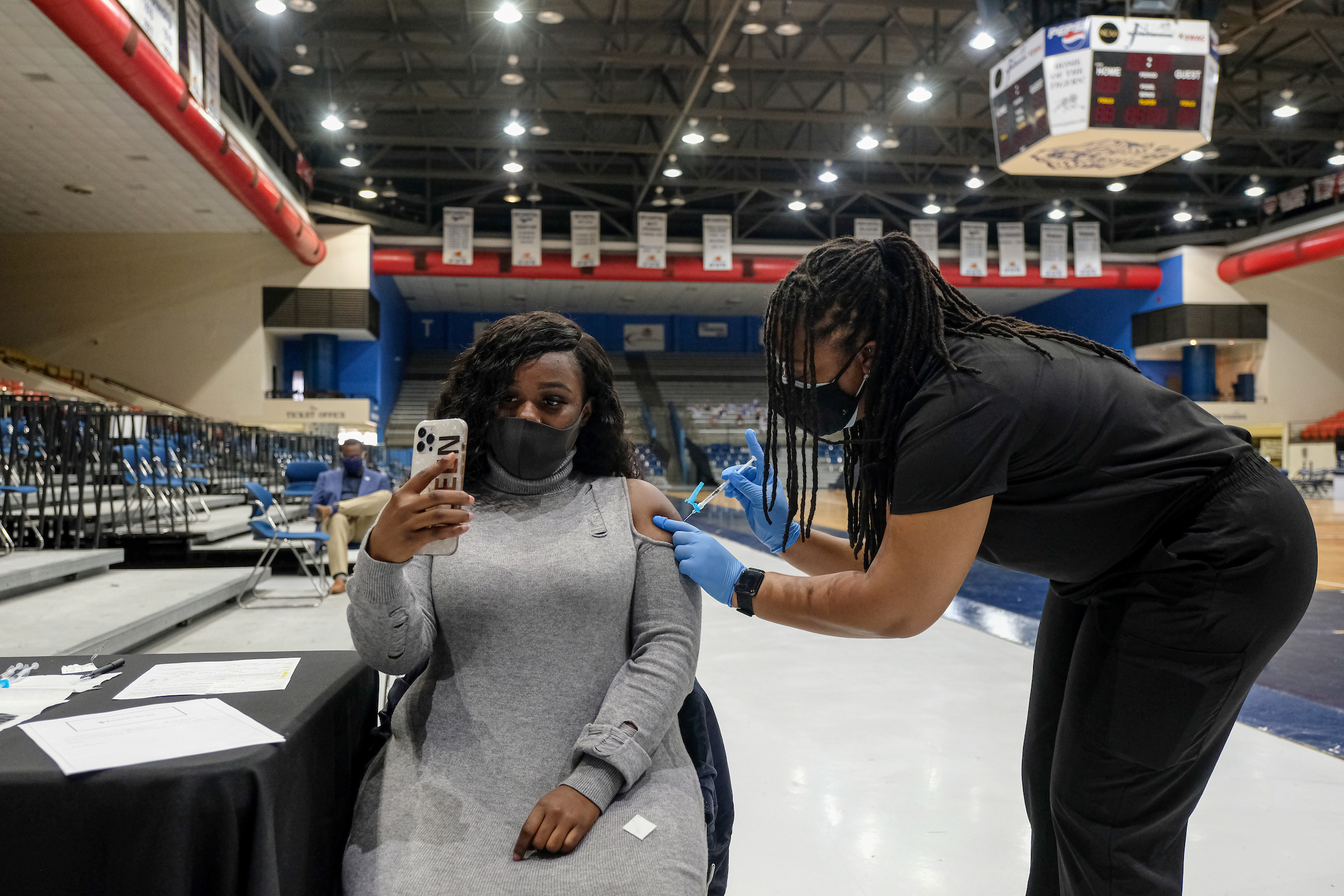
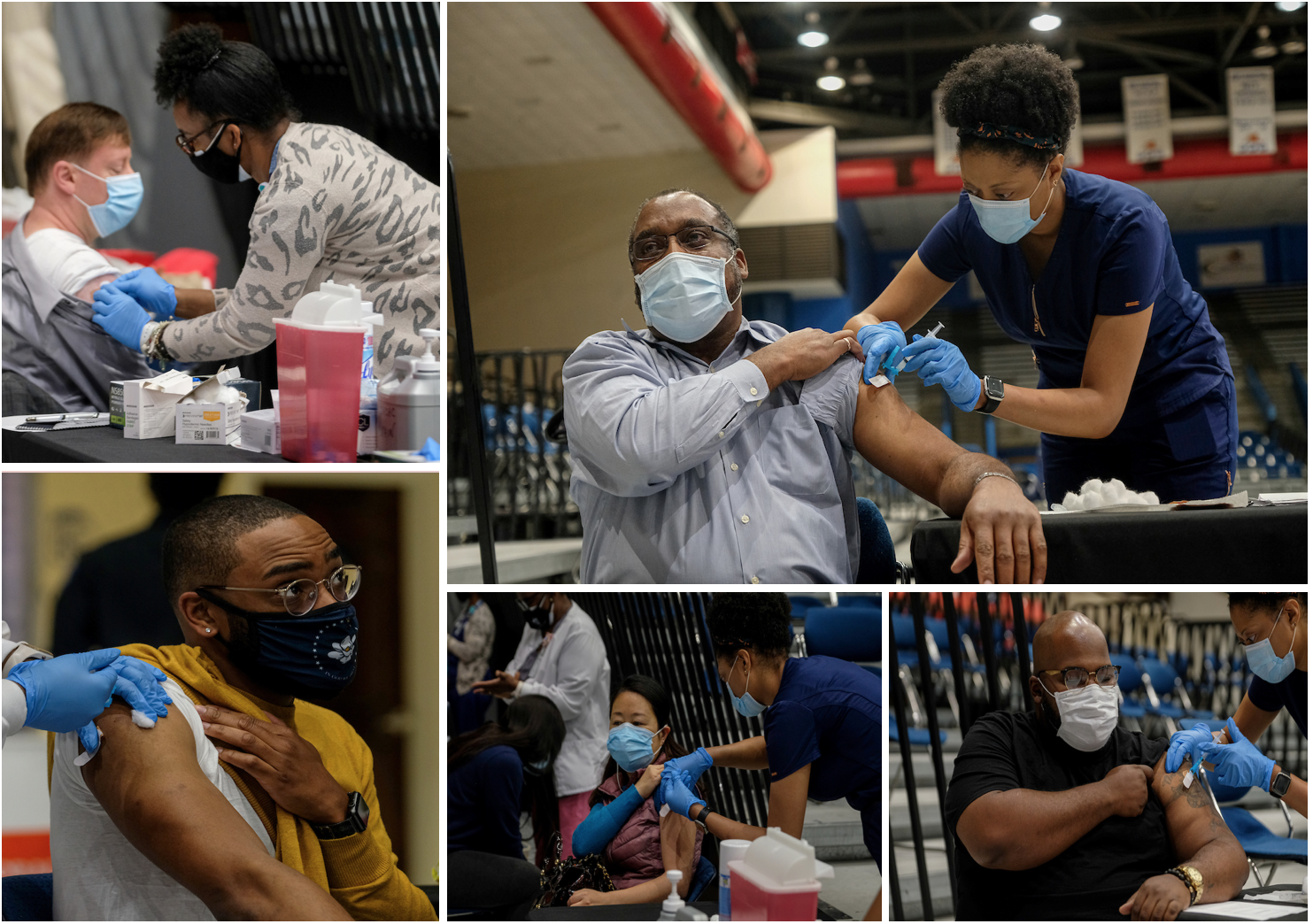



 Cortez Smith, public safety officer: “I feel like everyone should get it. There’s a lot of doubt, and people are saying the vaccine came out too soon. They don’t know if it’s effective or not. But I feel that we should take that chance. I actually had it. I was traveling to Ohio because that’s where I’m from. So, when I got back I had headaches. It didn’t really impact me too much. My girlfriend had it, and it hit her really bad. We got it at the same time. I don’t usually get headaches. I don’t get sick. I knew something was up. She had left work and went to get tested, and she said she was positive. Everything started adding up because I had a headache, and that’s really the only thing I had. And my nose was running a little bit. And that’s when I went to get tested, and I had the virus as well. After getting the vaccine, I feel a little more comfortable. I’ll still be on my p’s and q’s by wearing my mask and still following the procedures and guidelines.”
Cortez Smith, public safety officer: “I feel like everyone should get it. There’s a lot of doubt, and people are saying the vaccine came out too soon. They don’t know if it’s effective or not. But I feel that we should take that chance. I actually had it. I was traveling to Ohio because that’s where I’m from. So, when I got back I had headaches. It didn’t really impact me too much. My girlfriend had it, and it hit her really bad. We got it at the same time. I don’t usually get headaches. I don’t get sick. I knew something was up. She had left work and went to get tested, and she said she was positive. Everything started adding up because I had a headache, and that’s really the only thing I had. And my nose was running a little bit. And that’s when I went to get tested, and I had the virus as well. After getting the vaccine, I feel a little more comfortable. I’ll still be on my p’s and q’s by wearing my mask and still following the procedures and guidelines.”
